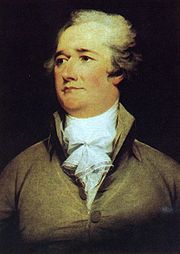
Federalist No. 67
Encyclopedia

Essay
An essay is a piece of writing which is often written from an author's personal point of view. Essays can consist of a number of elements, including: literary criticism, political manifestos, learned arguments, observations of daily life, recollections, and reflections of the author. The definition...
by Alexander Hamilton
Alexander Hamilton
Alexander Hamilton was a Founding Father, soldier, economist, political philosopher, one of America's first constitutional lawyers and the first United States Secretary of the Treasury...
and the sixty-seventh of the Federalist Papers
Federalist Papers
The Federalist Papers are a series of 85 articles or essays promoting the ratification of the United States Constitution. Seventy-seven of the essays were published serially in The Independent Journal and The New York Packet between October 1787 and August 1788...
. It was published on March 11, 1788 under the pseudonym
Pseudonym
A pseudonym is a name that a person assumes for a particular purpose and that differs from his or her original orthonym...
Publius, the name under which all the Federalist Papers were published. This essay's title is "The Executive Department", and it begins a series of eleven discussing the powers and limitations of that branch.
In this paper, Hamilton draws a distinction between the constitutionally limited executive powers of the president and the far more extensive powers of a monarch
Monarch
A monarch is the person who heads a monarchy. This is a form of government in which a state or polity is ruled or controlled by an individual who typically inherits the throne by birth and occasionally rules for life or until abdication...
as a ruler. He also chastises opponents of the Constitution who believe the President is granted excessive power by being allowed to fill vacancies in the Senate. Hamilton points out this power is limited in scope as the President's appointments expire at the end of the Senate's next session, and permanent appointments are left to the state legislatures.

